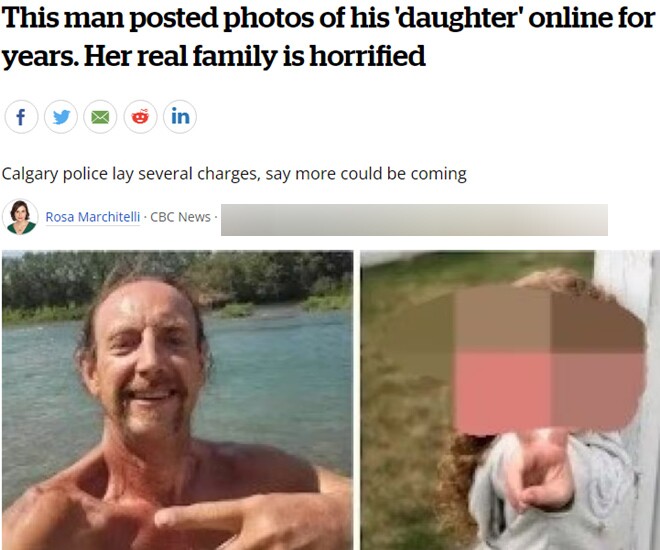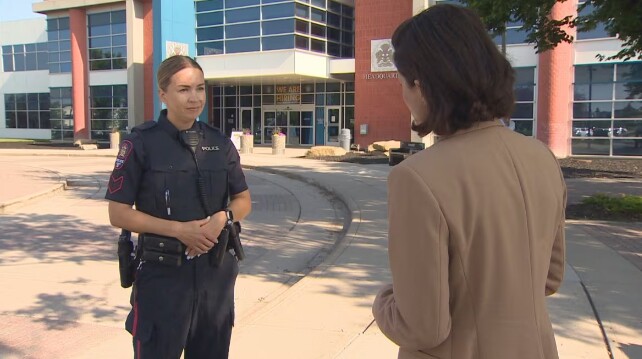Sharing your child’s photos online may seem harmless, but it carries significant risks. Posting these images can inadvertently expose personal information, leaving children vulnerable to privacy invasions, exploitation by malicious individuals, or even threats to their real-life safety.
Consider the story of a young girl whose images were misused for eight years without her parents’ knowledge.
According to CBC News, a Calgary couple was shocked to discover that a stranger had stolen their daughter’s photos from social media.

Police identified the man as Brian Keith Strachan, also from Calgary, who claimed to be a single father in distress. He had been posting photos of the girl, now eight years old, for years, falsely asserting he had raised her since birth. He even gave her a fake name, Amanda.
The scheme was exposed when a relative saw the girl’s photos online and alerted her biological parents.
The girl’s father, Kenny, expressed shock and disgust in an exclusive interview: “I was horrified and disgusted to find out he had these… I couldn’t believe it.”
Her mother, Tamara, added: “It’s appalling, heartbreaking. I didn’t know what to do.”
They reported the incident to the police and provided CBC News with dozens of Strachan’s photos from Facebook, Instagram, and Twitter, which have since been deleted or suspended.
The images showed the girl from her toddler years to just days before the discovery.


Brian Keith Strachan’s portrait.
Strachan posted from the girl’s perspective: “If I grow up to be like Dad, I’ll consider my life half a success.”
Another photo showed the girl in a graduation cap and gown after finishing kindergarten: “If I can teach my 8-year-old daughter Amanda how to make money, I can and will teach you too.”
On Facebook, Strachan claimed to be “single, never married, and childless.” He alleged he became Amanda’s guardian after her 14-year-old mother gave birth, allowing her to continue her education.
He also detailed his financial struggles as a single father in several posts.
CBC News learned that Strachan attended fundraisers for abuse victims, sharing his story and requesting money for gas, groceries, and essentials.
John Graham, chair of an organization called “Against All Abuse,” said: “He showed us her photos on his phone and on Facebook. It was truly shocking… It left us speechless.”
The family was further distressed to discover Strachan had posted detailed messages on a chat site about changing the girl’s clothes and diapers.

Calgary Police Acting Staff Sergeant Shelby Stewart called the case unusual but noted that online photo misuse is increasingly common.
She stated: “We’re seeing this more often, especially with social media’s growth over the past decade.”
Strachan faces charges of fraud under $5,000 CAD and two weapons-related offenses: unsafe storage and unlawful possession.
Police seized a computer, phone, and firearm from his home.
The girl’s family believed their social media settings were private but later found they were less secure than they thought.
The mother said: “I thought it was private. From now on, we won’t post photos. There are still family photos online, but only friends can see them.”
Police advise families to review privacy settings on all social media platforms.
In today’s digital age, social media is a popular way for parents to share their children’s milestones. However, this convenience comes with risks: stolen images, misused personal information, or emotional harm to children.
Parents must adopt safety measures to protect their children online while preserving memories.
1. Limit Personal Information in Posts
Avoid sharing sensitive details like school names, home addresses, or daily routines. These can be exploited by malicious individuals.
Also, refrain from posting private moments like bathing, sleeping, or crying, as these can be misused or cause distress.
2. Adjust Privacy Settings and Control Viewers
Use social media tools to restrict posts to close friends or trusted individuals. Disable public access and automatic tagging to prevent unauthorized sharing.
3. Blur or Conceal Identifying Details
When posting public photos, blur faces, license plates, or school logos. Editing apps can help protect your child’s identity online.
4. Respect Your Child’s Privacy and Emotions
Ask your child’s permission before posting, if they’re old enough to understand. This teaches them about privacy and strengthens your bond. Some photos may embarrass or upset them later.
5. Monitor and Remove Content Regularly
Regularly review old posts and remove any that pose risks. Teach your child about online safety so they can protect their privacy as they grow.
































